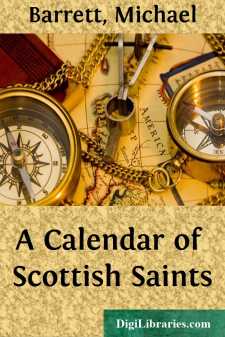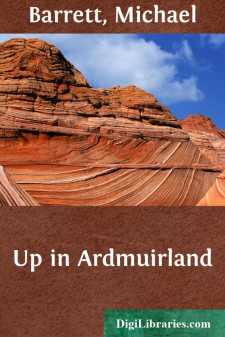Categories
- Antiques & Collectibles 13
- Architecture 36
- Art 48
- Bibles 22
- Biography & Autobiography 813
- Body, Mind & Spirit 141
- Business & Economics 28
- Children's Books 12
- Children's Fiction 9
- Computers 4
- Cooking 94
- Crafts & Hobbies 4
- Drama 346
- Education 46
- Family & Relationships 57
- Fiction 11826
- Games 19
- Gardening 17
- Health & Fitness 34
- History 1377
- House & Home 1
- Humor 147
- Juvenile Fiction 1873
- Juvenile Nonfiction 202
- Language Arts & Disciplines 88
- Law 16
- Literary Collections 686
- Literary Criticism 179
- Mathematics 13
- Medical 41
- Music 40
- Nature 179
- Non-Classifiable 1768
- Performing Arts 7
- Periodicals 1453
- Philosophy 64
- Photography 2
- Poetry 896
- Political Science 203
- Psychology 42
- Reference 154
- Religion 513
- Science 126
- Self-Help 83
- Social Science 81
- Sports & Recreation 34
- Study Aids 3
- Technology & Engineering 59
- Transportation 23
- Travel 463
- True Crime 29
A Calendar of Scottish Saints
by: Michael Barrett
Description:
Excerpt
INTRODUCTION
The title of Scottish, applied to the holy ones whose names occur in these short notices, must be understood to refer not so much to their nationality as to the field in which, they laboured or the localities where traces of their cultus are to be found. The Calendar here submitted does not pretend to be exhaustive; the saints therein noted are those who appear prominently in such records as remain to us and in the place-names which still recall their personalities.
In this new edition much additional information has been inserted, and many emendations made to render the Calendar as complete as possible.
The chief sources relied upon in the compilation of the work are:
The Breviary of Aberdeen, drawn up by Bishop Wm. Elphinstone, and printed in 1509.
Dr. Forbes' Kalendars of Scottish Saints.
Origines Parochiales Scotiae.
Dr. Skene's Celtic Scotland.
Canon O'Hanlon's Lives of Irish Saints.
Cardinal Moran's Irish Saints in Great Britain.
New Statistical Account of Scotland.
The date at the head of each notice is generally that of the death of the saint concerned.
JANUARY
1—St. Ernan, Abbot, A.D. 640.
The Saint whose feast is celebrated on this day was a disciple of the great St. Columba, and is said by Colgan, the renowned Irish scholar, to have been his nephew. What connection the saint had with Scotland is not clear. He may have laboured for a time there under St. Columba, but he became Abbot of Drumhome in Donegal. On the night St. Columba went to his reward, as we are told by that saint's biographer, St. Adamnan, Ernan was favoured with a vision in which the saint's death was revealed to him. St. Ernan died in his Irish monastery at an advanced age in the year 640. The church of Killernan, in Ross-shire, is named after him. Another dedication to this saint is thought by some to be Kilviceuen in Mull.
4—St. Chroman or Ghronan, A.D. 641.
On account of the destruction of so many ecclesiastical records at the Reformation, many {2} particulars regarding some of our Scottish saints have been irrevocably lost. This is the case with the holy man before us. All that we know of him may be told in a few words. He lived in the Cunningham district of Ayrshire, where he was revered during life and venerated after death for his great sanctity. On his deathbed we are told he kept continually repeating those words of the 83rd Psalm, "My soul longeth and fainteth for the courts of the Lord. My heart and my flesh have rejoiced in the Living God."
7—St. Kentigerna, Recluse, A.D. 733.
Like so many holy souls whose lives drew down the grace of Heaven upon the land, St. Kentigerna was of Irish race. Her brother, St. Comgan, succeeded their father, a prince of Leinster, in the government of his territory. Meeting with violent opposition from the neighbouring princes, on account of his just and upright Christian rule, St. Comgan was obliged to fly the country, and together with his widowed sister, who had been married to an Irish prince, took refuge in Scotland. St....



